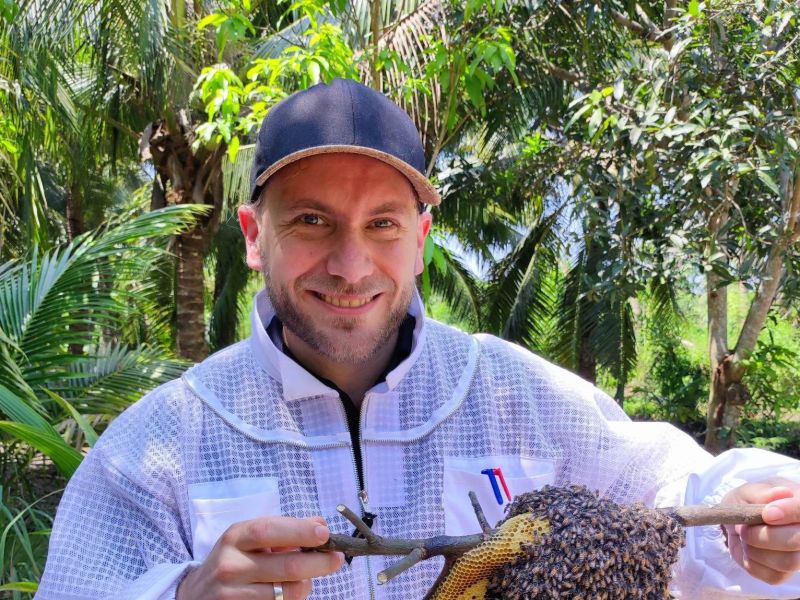Giving Beekeeping Guidance by cOmputatiOnal-assisted Decision making
An early warning system for bee colonies: Dr. Alexis Beaurepaire presents B-GOOD in a recent interview
Bee colonies are shrinking worldwide and Dr. Alexis Beaurepaire is on the trail of the causes. In a recent interview, he explains how he uses data to predict the health of bee colonies. Alexis is a B-GOOD project collaborator at the Institute for Bee Health, University of Bern and at the Center for Bee Research at Agroscope, Swiss Federal Competence Center for Agricultural Research.
In the interview, he shares how B-GOOD seeks to promote sustainable beekeeping in Europe, addressing environmental, societal, and economic aspects. Key threats to bee health, such as Varroa mites and pesticides, are targeted for understanding their cumulative impact. Utilising multidisciplinary expertise, the project collects extensive data over four years to develop predictive models for bee colony health. Some of the challenges Alexis mentions include overcoming interdisciplinary barriers and analysing large volumes of data.
The interview was conducted for the University of Bern, which is one of the top 150 universities globally and a top-class performer in research areas of great social and scientific importance. With this aim in mind, the University of Bern conducts excellent research and teaching and offers high-quality advanced training and services. More about it you can learn here.

Dr. Alexis Beaurepaire. Foto: unibe
If you want to watch (in French) or read (in German) the full interview, you can find it in the Anzeiger Bern or their online magazine uniAKTUELL.
Interview translated in English (via automated translation):
What do you want to find out?
The main aim of the B-GOOD project is to promote the development of sustainable beekeeping in Europe. By sustainable, I mean beekeeping that takes into account the environment, society and also the economy. Many different skills are needed to develop such sustainable beekeeping. Accordingly, the B-GOOD project consists of 17 partners across Europe, from Finland to Portugal, from the United Kingdom to Romania and Switzerland - with the University of Bern, of course. Together, we want to find out which factors influence bee colonies and cause their mortality.
Why is this important from a scientific point of view?
The multidisciplinary nature of the B-GOOD project allows us to recognize how different factors interact with each other. Take the destructive Varroa mite: this is a parasite that threatens the health of bees here in Europe. It transmits viruses to them and attacks the brood, i.e. the young developing bees. It considerably weakens the colonies. In addition, there are pesticides, some of which are known to have very harmful effects on bee colonies. Thanks to the various expertise we have in our team, we will be able to study not only how these factors act individually, but also how they interact with each other and how these accumulated factors affect the health of the bees.
What benefits could this have for society?
It is well known that bees and other pollinators play a central role for the environment, but also for agriculture and the economy. Bees pollinate flowers and ensure their reproduction. They also ensure the production of fruit and vegetables. The B-GOOD project therefore aims to improve the health of bees so that we can continue to benefit from the ecosystem services they provide for us.
What fascinates you personally about this research project?
What I find very interesting is the combination of different expertise that will allow us to create a model to predict the health of bees. This model is based on data that we have collected over the past four years. This is biological data on pathogens that infect bee colonies, the environment and flowers around them, beekeepers' beekeeping, economic data and also weather data. With this model, we will not only be able to bring all this together and analyse it, but also predict future developments. So we feed the model with data, and based on how a colony is behaving at the moment, it will be able to predict how the colony will be doing in about two weeks' time. This model will enable beekeepers to recognize certain problems in their colonies at an early stage.
What is the biggest challenge?
There are actually two: the first was that we all had to work together - a difficult task. We have engineers and researchers from different disciplines in the project and we also work together with beekeepers and other stakeholders. Over the course of the project, we have managed to understand each other and speak the same language. This is a real success and has been very enriching for everyone.
The second challenge at the moment is data analysis. There is a lot of different data being collected in the project. We have to analyse it, incorporate it into the model and also understand exactly what we have observed and collected. For example, we have networked tools in our hives that measure temperature or weight and send data every 15 minutes - all year round, and have been doing so for three years. We have 350 colonies that are networked with these instruments throughout Europe. That's a pretty impressive amount of data that comes together.
How is the project funded?
B-GOOD is a project under the European Commission's Horizon 2020 program. These are projects aimed at research and innovation. Our project does both: for example, we have developed tests that can be used to detect viruses or pesticides - very similar to rapid Covid tests, these enable rapid diagnosis on site. Such tools will also be incorporated into the project as innovations.